スイス・ローザンヌのLe Matin紙が、現在の航行中の被爆者の一人である
平井昭三さんのインタビュー記事を載せました。
和訳された記事:
フランス語を英訳されたものを日本語に訳しましたので、紹介します。
本来はもっと長い記事なのですが、一部を抜粋して載せました。
____________________________
平井昭三さん:「核のテクノロジーに裏切られた気分」
平井さんが広島で原爆に遭い、キノコ雲を目撃したのは16歳の時だった。そして81歳の今日、彼は福島原発から白煙が上がるのを見た。彼は父と弟を原爆で亡くし、母を放射線による甲状腺ガンで亡くしている。現在彼は平和推進論者である。
平井さんは言う。「ずっと原子力は安全だと言われてきた。今までこんなことになるなんて思ってもみなかった。でも放射能の危険性を考えれば、もう原子力は止めるべきだ。」
現在、日本には約20万人の被爆者がおり、そのうちおよそ2千人が放射能の影響による病に冒されている。
被爆者団体は、放射能に晒された福島の人たちが、広島・長崎の被爆者たちが受けたような不当な差別を受けるのではないかと心配しているが、平井さんはそうは思っていない。
「広島では誰も放射能について知識がなかったため、噂が広まった。しかし今日の放射線の被害者は適切な治療を受られるだろうし、差別されることはないでしょう。福島の人たちは日本人の善意・優しさを信じて、生き続ける勇気を持ってくれると信じている。」
彼の言葉には重みがある。1945年8月6日、一瞬にして広島を廃墟と化し、7万人もの命を奪った原爆が落とされた時には、彼にはたくさんの勇気が必要だった。その朝、彼は爆心地から4キロ付近を歩いていた。突然辺りが真っ暗になり、街の方角に巨大で真っ黒なキノコ雲が立ち上っていたのだ。彼がすぐに思ったのは母親のこと。しかし街は炎に包まれ近づくことはできなかった。しばらくしてからやっと体中にガラスの破片が刺さった母親と再会できたが、ついに父親と弟は見つけることができなかった。
戦後、平井さんは核軍縮推進者となった。現在は広島平和記念館でボランティアのガイドをする傍ら、ピースボートに乗船し世界中を廻りながら被曝証言を続けている。
福島の原子力発電所の事故の後、核兵器や核エネルギーに反対する気持ちがさらに強くなった。「我々はエネルギーの使い方を考え直し、徐々に原子力を無くしていかねばならない。昔はもっと自然を尊重し、太陽に感謝を示していたものだ。」しかし、彼は変化には時間がかかることを承知している。
平井さんは、もっと謙虚になろうと呼びかけている。「所詮、人間の技術は自然の力には敵わないのだ。」
英訳された記事:
Shoso Hirai: “I feel betrayed by nuclear [technology]”
Shoso Hirai was 16 years old when he saw the mushroom cloud on the city of Hiroshima, and 81 years old when white smoke rose from the Fukushima nuclear plant. He lost his father and his little brother in the explosion of the A-bomb. Her mother died a few years later of thyroid cancer caused by radiation. Today, he is a pacifist advocate.
Today Shoso Hirai believes he has been deceived by the prospects of peaceful nuclear energy. “I feel betrayed. We have always been told that nuclear energy was clean and safe. Until Fukushima, I had nothing against nuclear energy. Today, in light of the risks of radiation, I believe we must give it up. ”
There are over 200 000 Hibakushas in Japan today, among them some 2000 suffer from illnesses caused by radioactivity.
Associations of Hibakusha fear that those who have been exposed to radiation in Fukushima may endure the same discriminations as the survivors of Hiroshima and Nagasaki, including in terms of employment as uneducated people feared they could be contaminated by working with them.
Hirai Shoso doesn’t want to be negative: “In Hiroshima, nobody knew anything about radiation. That’s why rumors spread. ” He expects today’s victims of radiation will receive appropriate medical treatment. “Even if they are left with long-term effects, I do not believe they will be discriminated against. I hope that those irradiated in Fukushima can count on the goodwill and kindness of the Japanese people. I hope they find the courage to continue living. ”
Shoso Hirai knows what he is talking about: it took him a lot of courage on August 6, 1945, when the nuclear bomb turned Hiroshima into ruins, instantly killing 70,000 people.
On that very morning, he was heading towards the munitions plant where the government had assigned him to work. He was walking some 4 km away from the epicenter when the atomic bomb exploded. “Everything around me became dark. After a few minutes, I looked toward the city. I saw a huge black mushroom-shaped cloud. ”
The then-young Shoso only had one thing in mind: find his mother who had stayed at home, in the family house located just 2km from the epicenter. But he was unable to get close to it, as the center of Hiroshima was in fire. After long hours, Shoso’s mother finally appeared, her arms and face wounded by pieces of glass. They spent the night together in a farm.
The next day, Shoso ventured into town with his mother to look for his father. In place of their family home lied their bathtube, standing in fire. He never found anything else than his father’s bike in his office. And never found the remainings of his 13 y.o. little brother either.
After the war, Hirai Shoso became an advocate for nuclear disarmament. He now works as a volunteer guide at the Hiroshima Peace Museum and gives testimonies around the world onboard Peace Boat, a Japanese NGO.
The accident at the plant in Fukushima has changed his views, extending his opposition to nuclear weapons to nuclear energy. “We must rethink the way we consume energy and move away gradually from the atom. In the past, people were more respectful of nature. They used to thank the sun for allowing them to have a good day of work. ” But he is aware that changes take time. According to him, many Japanese have a hard time adjusting to their evolving lifestyle in a society obsessed with money.
Meanwhile, Shoso Hirai calls on people to remain humble: “The Fukushima incident should be read as a sign that no human technology can withstand the force of nature.”
もとのフランス語の記事のリンクです。
http://www.lematin.ch/actu/monde/shoso-hirai-sens-trahi-nucleaire-398623
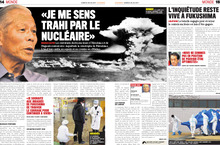

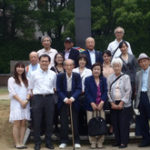
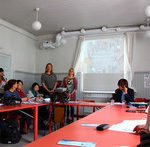
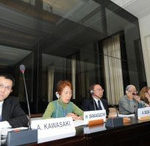
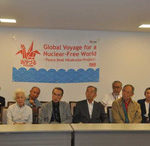
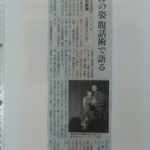
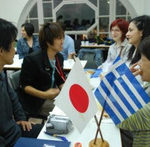
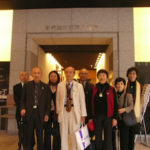
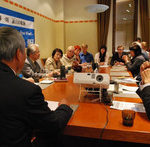
この記事へのコメントはありません。